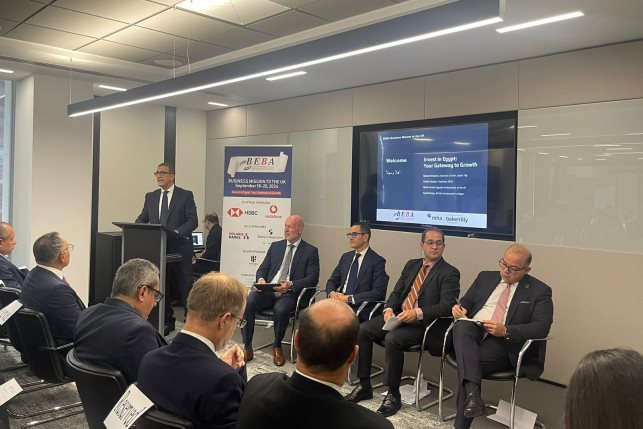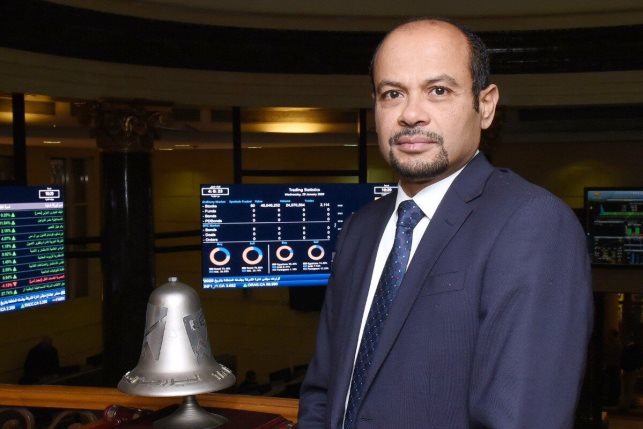Egypt's Finance Minister Outlines Economic Reforms and Investment Prospects During London Investor Meetings
Egypt's Finance Minister met with investors in London, discussing economic reforms and investment opportunities.
 Egyptian Finance Minister Ahmed Kouchouk engages with international investors in London, highlighting economic reforms and investment opportunities.
Egyptian Finance Minister Ahmed Kouchouk engages with international investors in London, highlighting economic reforms and investment opportunities.
• Investor Meetings: Ahmed Kouchouk, Egypt’s Minister of Finance, met with over 200 investors from major financial institutions and investment banks in London.
• Economic Policy: Kouchouk addressed updates on the economic situation and financial policy priorities during meetings with the British Egyptian Business Association (BEBA) and the Arab Bankers Association.
• JPMorgan Conference: At the JPMorgan Global Markets Conference, Kouchouk discussed positive budget performance and strategies for reducing debt-to-GDP ratios, and engaged in extensive dialogues with investors.
• Tax Reforms: The minister highlighted ongoing efforts to simplify the tax system and facilitate tax procedures, including measures to resolve disputes and support businesses.
• Investment Opportunities: The mission included discussions with various stakeholders on increasing investments in Egypt, promoting key sectors like automotive and tourism, and exploring financial instruments like sukuk and green bonds.

Ahmed Kouchouk, Minister of Finance, conducted a new round of discussions with over 200 investors from major financial institutions and investment banks in London. During his first participation in meetings with the British Egyptian Business Association (BEBA) and the Arab Bankers Association, Kouchouk conveyed key messages regarding the current economic situation, financial and economic policy priorities in light of the government's work program, and exchanged views with the British business community, including companies operating in Egypt and those interested in entering the Egyptian market.

Minister of Finance Ahmed Kouchouk
At his first appearance at the JPMorgan Global Markets Conference, which saw strong attendance from global financial institutions and investment banks, Kouchouk outlined the positive financial performance indicators of the budget for June, emphasizing the continuation of the economic reform program. He detailed the strategy for reducing debt-to-GDP ratios and conducted an open dialogue for over three hours with 60 investors in three consecutive meetings, reflecting their interest in increasing investments in the Egyptian capital market. The minister addressed their inquiries in a balanced and objective manner.
The minister also held bilateral meetings with various companies to discuss ways to increase their investments in Egypt, given the promising economic incentives and opportunities. During his meeting with representatives of the London Stock Exchange, investors expressed their interest in investing in the Egyptian market. Additionally, in his discussion with PricewaterhouseCoopers, Kouchouk explored enhancing cooperation to localize key global practices in tax system simplification and evaluate the Egyptian experience, explaining the first phase of tax facilitation.
Kouchouk emphasized the Ministry's readiness to review priorities with business partners for more dynamic and impactful financial policies. He noted that policy evaluations will focus beyond financial indicators to include growth stimulation, competitiveness enhancement, and support for production and exports. The aim is to foster a fair business environment with incentives linked to achieving targeted outcomes and reducing investment risks.
He outlined three main financial policy priorities for the short term: simplifying the tax system, building "bridges of partnership" with taxpayers, reducing "uncertainty," and easing administrative costs. The first phase of tax facilitation includes ambitious measures to resolve disputes, address accumulated tax issues, eliminate fines, expedite sample audits for all taxpayers, support corporate liquidity with a central settlement mechanism and VAT refund speed, and establish an integrated, simplified tax system to encourage startups, small businesses, freelancers, and professionals.
Kouchouk highlighted the ministry's efforts to reframe financial policies to better support economic activities and development programs with specific outcomes. He emphasized the provision of appropriate funding for the automotive manufacturing and export strategy, including electric vehicles, and a package of incentives for localizing key information technology industries. Additionally, a new incentive to accelerate hotel room construction was announced as part of tourism sector promotion efforts.
The minister acknowledged that the biggest challenge is reducing debt-to-GDP ratios and is proactively addressing it through a comprehensive strategy, including issuing new financial instruments like sukuk and green bonds to diversify funding sources and attract new investor segments. The goal is to convert some debt into investments, reduce reliance on short-term funding, support financial sustainability efforts, create fiscal space for social spending, support productive sectors, and enhance investment in human development.
International investors indicated that they see an ambitious vision from the Egyptian government for economic and developmental progress. They noted that "trust, partnership, support, and certainty" are the key expectations from any government seeking to attract more investment flows. They acknowledged that Kouchouk's explanations provided a balanced view of Egypt's economic situation between the current reality and the government's targeted goals through various policies, programs, and measures.
The largest official, commercial, and investment delegation from Egypt is participating in the UK door-knocking mission, aimed at showcasing investment opportunities in Egypt and discussing economic indicators' progress post-March 6 measures, as well as supporting foreign direct investment.
The Egyptian trade mission is holding several meetings in London, organized by the British Egyptian Business Association. It includes several ministers, such as Ahmed Kouchouk, Minister of Finance; Hassan Khatib, Minister of Investment and Foreign Trade; Rami Abul Naga, Deputy Governor of the Central Bank of Egypt; and heads of companies, banks, and businessmen. The mission is engaging in extensive meetings with British officials and company heads to foster investment and economic cooperation between Egypt and the UK.
The mission also includes Ambassador Sherif Kamel, Egypt's Ambassador to the UK; Gareth Bailey, British Ambassador to Cairo; Mohamed Abdallah, CEO of Vodafone Egypt; Khaled Naseer, President of BEBA; Ayman Essam, Head of External Affairs and Legal Affairs at Vodafone Egypt; Gamal Salah, Managing Director of POD; and Nadia Lemloum, CEO of BEBA, along with leading business figures and company executives across various economic sectors.





